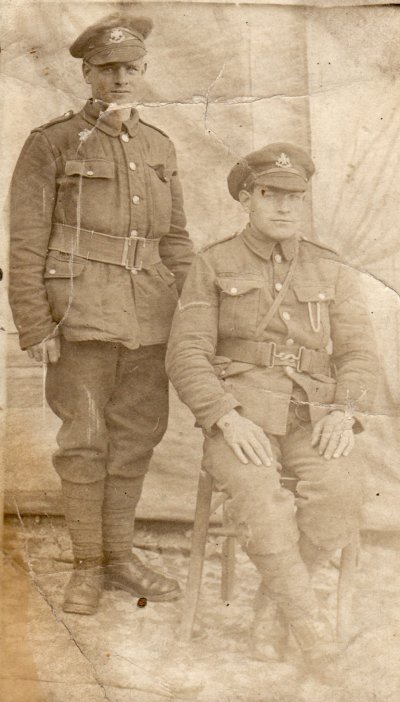Frederick Clough was born at the town of Wirksworth in Derbyshire in
1890 and was the third of ten children born to William and Mary Elizabeth
Clough, though one of these children died as a young baby. Fred's father
became a well-known Wirksworth character, known in the district as
"Whistling Billy". Fred was raised and educated at Wirksworth,
though he endured a difficult upbringing due mainly to the somewhat
eccentric and drunken behaviour of his disabled father. On completion
of his schooling it is likely that Fred spent a period working in one of
the local limestone quarries.
Three years before the relatively early death of his mother in 1909, Fred's
older brother, John William Clough, joined the army and was a regular
soldier prior to the outbreak of the Great War in 1914, and spent time
serving on colonial duty in India. This must have had an influence on Fred
and his younger brother, David Clough, who both signed up as territorial
soldiers with the 1/6th Battalion of the Sherwood Foresters (Notts and
Derbys Regiment). David signed up at Wirksworth in 1912 and Fred must have
signed up shortly afterwards and was assigned the regimental number of
2168. The Territorial Army was immediately mobilised on the outbreak of
the Great War, and the original four Sherwood Foresters Territorial
Battalions, the 5th, 6th, 7th (Robin Hoods) and 8th, formed what would
become known as the 139th (Forester) Infantry Brigade in the 46th
(North Midland) Division. In February 1915, Fred was part of the 139th
(Forester) Brigade, who had the distinction of being part of the first
Territorial Division to land in France and the division served on the
Western Front for the duration of the war. By the end of the year Fred
had been engaged in heavy fighting and the following year he was involved
in the Battle of the Somme where he was wounded on two occasions. The
second wounding saw him buried in the debris caused by a shell bursting.
On the 28th of May 1917, whilst fighting with the D Company, Fred was
very badly gassed at Liévin. He was never to fully recover from the
awful effects of being poisoned by gas.
Briefly returning home on furlough to Wirksworth in early 1918, Fred
married Mary Elizabeth Flint of West End, Wirksworth, at Belper Register
Office on the 12th of March 1918. At the time of her marriage to Fred,
Mary already had two young sons, twelve year-old Robert Braithwaite Flint
and five year-old George Henry Flint (who was more commonly known as Pat,
or Harry) and Fred raised the boys as his own children. By the time of
his marriage in March 1918, Fred had been promoted to the rank of Lance
Corporal. Fred's union to his new wife, however, was to be short-lived as
he was summoned back to France despite his failing health. This must have
been a difficult time for his wife, who mourned the loss of her younger
brother, Mark Flint, who was killed in action in France in April 1918.
On the 29th of September 1918, Fred did splendid work as a Lewis-Gunner
in clearing out the village of Lehaucourt in France, twice knocking out
enemy machine guns who were holding up the advance. His action in moving
to the flank and engaging the hostile machine guns on three occasions
showed great initiative, courage and resource, and for such great
gallantry Fred was awarded the Military Medal in May 1919. Only a few
days after this gallant act, Fred was wounded again on the 3rd of
October 1918 whilst fighting at Ramicourt.
On returning from the war in 1918/19, Fred's health deteriorated at an
alarming rate and he spent time in Leicester Military Hospital. On his
return to Wirksworth, Fred and his wife lived on Greenhill and he worked
as a general labourer in the area. His only child, Mary Clough, was born
at Wirksworth in 1920 and times were difficult for the family as Fred
found himself in and out of work due to his failing health. He passed
away at his home at 31 Greenhill, Wirksworth, on the 15th of January 1925,
aged only 35 years. Fred was buried in his mother's grave in Wirksworth
Cemetery on the 19th of January, his coffin having been draped with the
Union Jack. Bereaved were his widow, his five year-old daughter and two
stepsons.
|


